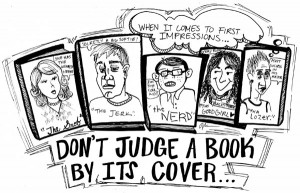First impressions don’t tell whole story
Here’s a piece of advice I’m sure you’ve heard before: “Remember — first impressions are everything.” It’s a bite-sized recommendation, omnipresent in career pamphlets, self-help books and chirpy dating columns.
Many of us have accepted it as common sense. It has a nice ring to it. Yet the underlying message is sinister: If at first you don’t succeed, don’t try, try again — you blew it. It’s a call to give up that masquerades as a helpful tip, and it encourages a mindset that prevents people from taking ownership of their gaffes and recovering gracefully.
Thus, the idea that first impressions are everything is little more than a self-fulfilling prophecy. Accept it at your own risk.
This advice is most commonly given before job interviews. Reasonable as it seems in such a formal environment, imagine hearing it right before you step into the interviewer’s office. You’re smart, you’re qualified, you ate a balanced breakfast and you really felt like you could nail this talk.
But you’re now painfully reminded that any mistake you make could bring down the whole house of cards. Instead of feeling empowered, you’ve framed yourself as helpless.
First impressions aren’t a death sentence. Even if you trip into the office or say something embarrassing right off the bat, being able to recover shows maturity and quick thinking — qualities that appeal to any employer. If you mispronounce your interviewer’s name, she’ll like you far more if you apologize and carry on with poise than if you spend the rest of the interview contemplating your shoes.
For instance, take my job. I’m an SCaller; in short, I call USC alumni I’ve never met and ask them to donate to the school. The potential for awkward situations is astronomical.
First of all, people tend to loathe solicitors from the get-go. Second, I butcher names and introductions like nobody’s business. But I can’t count the number of times that I’ve gotten initial eye-rollers to donate.
As mortifying as it is to carry on with the knowledge that I’ve been judged, I put myself in a position of control. I breathe, remind myself that I’m working for a good cause and proceed to tell the alumni about all the wonderful programs we have at USC. A focus on first impressions would literally prevent me from doing my job.
I won’t pretend that my experiences apply to everyone. Luckily, popular culture is on my side.
Consider a few famous stories: Pride and Prejudice, in which the protagonist marries a man she detests for most of the book; the Harry Potter series, in which Harry and Ron think Hermione is a nuisance before she completes their trio; The Breakfast Club, in which the teens see each other’s worst behavior and become friends anyway. To list every popular story with a similar plot, I’d have to camp out in Leavey Library for days.
These stories have touched and enthralled millions of people. To enjoy a story, people must relate to it; thus, it’s reasonable to assume that on some level, we’re all aware of the fact that first impressions are often wrong — and that they’re worth overcoming.
Of course, the characters I listed went through extreme circumstances before they changed their minds, but it is worth noting that the impressions themselves were extreme, too. The real world is far less dramatic. Most first impressions are fairly mild. We don’t need trolls and Saturday detention to turn them around.
First impressions are not black-and-white. They play a part in people’s decisions, but it’s rather extreme to say that they create irreparable dents.
The off-color comment you made to your interviewer is no roadblock — it’s a challenge to step up your game. With calmness, tact and a little cleverness, it can become nothing but a bump in the road.
Maya Itah is a junior majoring in communication and international relations. Her column, “Wait, Think Again,” runs every other Friday.

